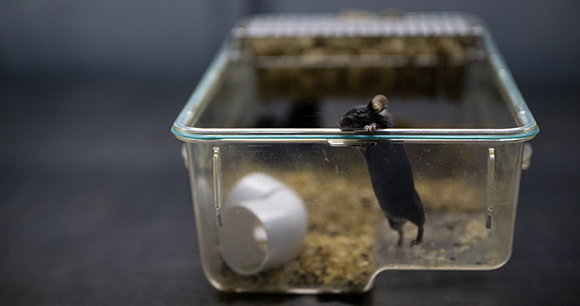
Washington, DC—The Animal Welfare Institute (AWI) applauds recent announcements by the National Institutes of Health and the US Food and Drug Administration about their plans to reduce the use of animals in research and testing.
At the same time, however, the Trump administration has moved to cut funding for a wide swath of research—including innovative nonanimal alternatives—and dramatically reduce the number of scientists, veterinarians, and others in the federal workforce who have a role in protecting animal welfare. These moves call into question the feasibility of proposals by the NIH and the FDA to reduce animal use, and raise serious concerns about the potential impacts on animal welfare and science more generally. Indeed, the administration’s actions appear to be at cross-purposes with its purported goals. Replacing animal models with nonanimal ones requires robust funding for research and a sufficient number of scientists to carry out the work.
The administration’s actions are more consistent with an anti-science agenda than a pro-animal one. A government dedicated to alleviating animal suffering would increase funding for nonanimal alternatives, not halt progress at labs advancing those technologies. It would form plans to rehome the animals currently in the system and increase protections, oversight, and regulations at the federal level. And it would allocate more—not fewer—resources for research aimed at managing and preserving threatened and endangered species. Instead, animals and some research into animal-replacing technologies have become collateral damage in the administration’s larger assault on science.
In recent months, the administration has engaged in a multipronged strategy to drastically cut funding for scientific research by capping, canceling, or delaying funds provided by national funding agencies, including the NIH—the largest funder of biomedical research in the world. The administration has canceled research grants on specific topics it deems controversial. In addition, it announced that dozens of universities are currently “under investigation,” and it has already frozen or canceled billions of dollars in federal funding to several of those universities for failing to comply with the administration’s demands, which vary from institution to institution. Among the current casualties of this funding freeze is research at Harvard University’s Wyss Institute, which pioneered the most promising technology for replacing animals in tests and experiments: organ-on-a-chip. Much of that research relied on federal funding.
All told, the administration has terminated at least $9.5 billion in research grants, and many of these actions remain embroiled in litigation. Further research cuts are included in the administration’s fiscal year 2026 budget proposal, such as slashing scientific funding across the board and reducing the budgets of the NIH and the National Science Foundation by roughly 40% and 55%, respectively. Already, the administration has fired or pushed out significant portions of the federal scientific workforce, including an estimated one-eighth of employees at the NIH and nearly 20% at the FDA. International toxicology experts have declared that the administration’s actions will “throw public health and safety back to the stone age of safety science,” and could significantly impede the advancement of nonanimal models.
Replacing animals in laboratories entirely will require more innovative research, not less. This is because nonanimal models are still in the early phases of development, especially for “basic” research. This includes exploratory studies meant to advance general scientific knowledge, such as understanding the progression of disease, which comprise the bulk of research funded by the NIH. Nonanimal models are further along in regulatory testing programs, including those overseen by the FDA.
In the meantime, millions of animals remain in laboratories across the country, their welfare and lives hanging in the balance. The administration has threatened to drastically reduce the amount of funds provided for “indirect costs” at universities. Indirect costs cover, in part, animal welfare-related expenses such as enrichment programs, facility upgrades, ethical reviews and approval of study protocols, semiannual inspections, and salaries for animal care staff. Hundreds of animals have already been euthanized in laboratories, and many more remain at risk. Animals who are not euthanized will likely face lower standards of care and oversight.
For instance, the administration has already drastically reduced the US Department of Agriculture’s workforce, including employees tasked with enforcing the Animal Welfare Act (AWA) via its Deferred Resignation Program; further workforce reductions are anticipated. The USDA has a long history of failing to adequately enforce the AWA, due in part to insufficient staff. Continued loss of personnel and a renewed emphasis on deregulation will only exacerbate the situation, further diminishing the scant protections in place for animals in laboratories. This could result in even more violations of animal welfare laws and regulations—with less accountability.
AWI strongly supports a thoughtful, science-based transition to nonanimal methodologies, both to advance science and reduce animal suffering. However, it is difficult to celebrate perceived wins for animals in laboratories in this uncertain climate—when the administration’s evolving plans could jeopardize their welfare, and public health and environmental protection research that may benefit all animals (human and nonhuman) screeches to a halt.
Marjorie Fishman, Animal Welfare Institute
[email protected], (202) 446-2128
The Animal Welfare Institute (awionline.org) is a nonprofit charitable organization founded in 1951 and dedicated to alleviating animal suffering caused by people. We seek to improve the welfare of animals everywhere: in agriculture, in commerce, in our homes and communities, in research, and in the wild. Follow us on Facebook, Instagram, Threads, Bluesky, and LinkedIn for updates and other important animal protection news.